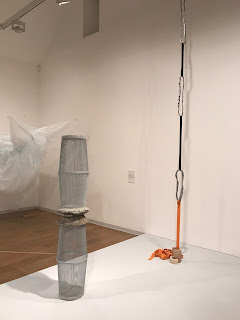Sculpture photographed in The White Chapel and Tate galleries
Sculptures photographed in the White
Chapel Gallery, London, interesting composition focused both on robust
materials such as metal and concrete, paired with more placid materials being
plastic (possibly plastic bags) and what appears to be ribbon.
The unusual, yet definite arrangement of these objects
creates shape, angle and negative space, which may lead you to question a potential
use for this sculpture as it is now acting as a part of the space in the Tate
Britain.
The way these seemingly random objects have been painted and
positioned within the context of the Tate, they have obtained a value that was
previously not present.
This piece is interesting in terms of how value
has been added to potential useless objects.
Following the previous piece, this sculpture also makes use
of every day objects (more recognisable as every day items than in the last
piece), possibly using the context of a museum, but also considered arrangement,
matching of objects and aesthetics to add value to otherwise worthless items.
This artwork fits very much into the idea of ‘Found objects’. “A found object
is a natural or man-made object, or fragment of an object, that is found (or
sometimes bought) by an artist and kept because of some intrinsic interest the
artist sees in it” much like the work of Ian Kiaer and Duchamp.
This piece also follows the ideas of assemblage; value being
added to these usually overlooked objects such as a piece of rope or wood once
being placed within the same environment.






Comments
Post a Comment